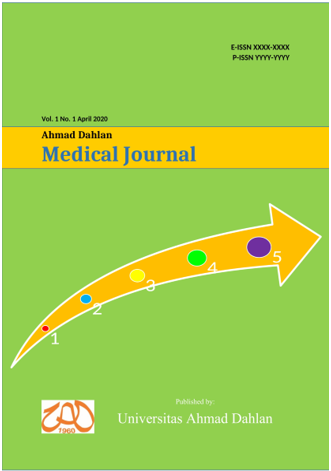Kaplan Meier's Analysis of Clinical Improvement Of Defecation Frequency In Pediatrics Patient With Diarrhea That Given Vitamin D As Adjuvant Therapy
DOI:
https://doi.org/10.12928/admj.v2i1.3460Keywords:
Diarrhea, Vitamin D, Defecation, Kaplan MeierAbstract
Diarrhea is the second leading cause of death in children under 5 years after pneumonia with a mortality prevalence of 8%. Diarrhea is a digestive disease with signs of bowel movements with a sudden consistency of loose stools 3 times or more in 24 hours, mostly caused by microorganisms (bacteria and viruses). The cure rate for diarrhea after receiving fluid replacement therapy and antibiotics for diarrhea caused by bacteria is quite high, but the mortality rate due to diarrhea is still high, therefore there needs to be an effort to add therapy to improve patient clinical outcomes. Vitamin D is known to play a role in the body's defense function, both in natural and adaptive immunity and plays a role in the body's defense in cases of infections, allergies, and autoimmunity. This study is an experimental double blind randomized clinical trial which was analyzed using Kaplan Meier. The research subjects were children aged 6 months to 18 years who were divided into two groups, namely the treatment group (n = 35) and the control group (n = 35). The treatment group received vitamin D and for the control group received a placebo. The data taken includes the results of the frequency of defecation of patients. The results of this study indicate that vitamin D is effective in accelerating the reduction in the frequency of defecation in children with diarrhea.Â
Keywords: Diarrhea, Vitamin D, Defecation, Kaplan Meier
References
Kementerian Kesehatan RI. 2012. Profil data Kesehatan Indonesia. Jakarta: Kementerian Kesehatan Republik Indonesia
UNICEF. (2018). Estimates of child cause of death, diarrhoea 2018.
Troeger, C., Khalil, I. A., Rao, P. C., Cao, S., Blacker, B. F., Ahmed, T., Armah, G., Bines, E. J., Brewer, G. T., Colombara, V. D., Kang, G., Kirkpatrick, D. B., Kirkwood, D. C., Mwenda, M. J., Parashar, D. U., Petri, A. W., Riddle, S. M., Steele, D. A., Thompson, L. R., Walson, L. J., Sanders, W. J., Mokdad H. A., Murray, J.L. C., Hay, I. S., Reiner, R. C. (2018). Rotavirus Vaccination and the Global Burden of Rotavirus Diarrhea among Children Younger Than 5 Years. JAMA Pediatrics, 172(10), 958–965.
Dairo, M. D., Ibrahim, T. F., & Salawu, A. T. (2017). Prevalence and determinants of diarrhoea among infants in selected primary health centres in kaduna north local government area, nigeria. Pan African Medical Journal, 28, 1–9.
Dinas Kesehatan Bantul. (2015). Laporan Kinerja Dinas Kesehatan Kabupaten Bantul Tahun 2015, (0274), 1–49.
Bikle, D. D. (2014). Vitamin D metabolism, mechanism of action, and clinical applications. Chemistry & Biology, 21(3), 319–329.
Dusso, A. S., Brown, A. J., & Slatopolsky, E. (2005). Vitamin D. American Physiological Society, 1–86.
Kong, J., Zhang, Z., Musch, M. W., Ning, G., Sun, J., Hart, J., Bissonnette, M., Li, Y. C. (2007). Novel role of the vitamin D receptor in maintaining the integrity of the intestinal mucosal barrier. AJP: Gastrointestinal and Liver Physiology, 294(1), G208–G216.
Kemenkes RI. (2011). Buletin Jendela Data dan Informasi Kesehatan Situasi Diare di Indonesia. Jurnal Buletin Jendela Data & Informasi Kesehatan, 2, 1–44.
Susanti, W. E., Novrikasari, & Sunarsih, E. (2016). Determinan Kejadian Diare Pada Anak Balita Di Indonesia (Analisi Lanjut Data SDKI 2012). Jurnal Ilmu Kesehatan Masyarakat, 7, 64–72.
Talachian, E., Bidari, A., Noorbakhsh, S., Tabatabaei, A., & Salari, F. (2015). Serum levels of vitamins A and D, and zinc in children with acute diarrhea: A cross-sectional study. Medical Journal of the Islamic Republic of Iran, 29.
Thornton, K. A., Marin, C., Mora-plazas, M., & Villamor, E. (2013). Vitamin D Deficiency Associated With Increased Incidence of Gastrointestinal and Ear Infections in School-age Children. The Pediatric Infectious Disease Journal, 32(6), 585–593.
Bener, A., Al-Ali, M., & Hoffmann, G. F. (2009). Vitamin D deficiency in healthy children in a sunny country: Associated factors. International Journal of Food Sciences and Nutrition, 60(SUPPL. 5), 60–70.
Downloads
Published
How to Cite
Issue
Section
License
Copyright (c) 2021 Universitas Ahmad Dahlan

This work is licensed under a Creative Commons Attribution-ShareAlike 4.0 International License.
License and Copyright Agreement
In submitting the manuscript to the journal, the authors certify that:
- They are authorized by their co-authors to enter into these arrangements.
- The work described has not been formally published before, except in the form of an abstract or as part of a published lecture, review, thesis, or overlay journal. Please also carefully read Ahmad Dahlan Medical Journal posting Your Article Policy.
- That it is not under consideration for publication elsewhere.
- That its publication has been approved by all the author(s) and by the responsible authorities - tacitly or explicitly - of the institutes where the work has been carried out.
- They secure the right to reproduce any material that has already been published or copyrighted elsewhere.
- They agree to the following license and copyright agreement.
Copyright
Authors who publish with Ahmad Dahlan Medical Journal agree to the following terms:
- Authors retain copyright and grant the journal right of first publication with the work simultaneously licensed under a Creative Commons Attribution License (CC BY-SA 4.0) that allows others to share the work with an acknowledgment of the work's authorship and initial publication in this journal.
- Authors are able to enter into separate, additional contractual arrangements for the non-exclusive distribution of the journal's published version of the work (e.g., post it to an institutional repository or publish it in a book), with an acknowledgment of its initial publication in this journal.
- Authors are permitted and encouraged to post their work online (e.g., in institutional repositories or on their website) prior to and during the submission process, as it can lead to productive exchanges, as well as earlier and greater citation of published work.


